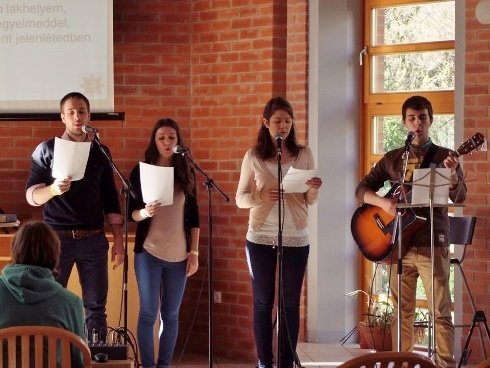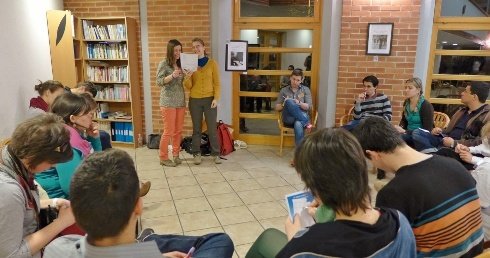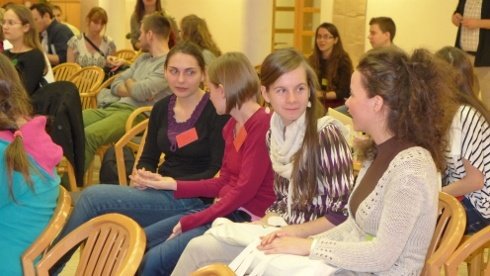University pastors from across the Carpathian Basin declare that gathering reformed young people can be the only goal of a university congregation; they are on a mission too. These congregations, in connection with higher education institutions, offer a spiritual community for those who know nothing about the Church or for those who are disappointed in it.
“We would like to reach out to young people with ‘street’ music and literature nights. We even try to go to pubs to increase the chances of meeting them. Connecting culture and Christianity really works,” Fanni Makkai, a law student from Kolozsvár, said sharing her experiences with us. This year students from over the borders also participated in the spring meeting of the university congregations, which was held at the end of March in Budapest.
Passing on
“It is true that the whole congregation wants to pass on the Gospel, that is why we will perform the Mark drama at two universities in Budapest,” said Gábor Édes, theologian and member of the Reformed University Mission in Pest (PROMISSZ).
“I started visiting the events of the university mission, because my own congregation is too far away. I cannot be in touch with them during the week, and often I don't even go home on weekends. Going two weeks without visiting a service and not participating in the life of the congregations would really bring me down.”
The last chance?
This was the 11th annual meeting of the reformed university congregations from the Carpathian Basin.
“This meeting serves multiple purposes: the reformed university students can network, get spiritually refreshed and learn about each other's cities,” Eszter Győrffy, the president of PROMISSZ, told us.

“The university congregations have been operating again since 1990. In the past few years, the number of students has multiplied. There are almost 200,000 young people in Budapest, who had lost contact with their original communities. The congregations in the town cannot handle so many new people, and the students have no strong Church relationships, so they can easily go astray. It probably won't be the first priority for them to look for a new congregation unless their connection with the Church is really deep and personal.
“Those students are in a special situation that the Church does not really pay attention to,” continued Eszter Győrffy.
“We concentrate on the issues of teenagers and families, but not on the university students, even though they are in a serious identity search. This is the first occasion when they can make their own real religious decisions, since they are not under family pressure anymore.”
It cannot be self-serving
“The original intention of the university congregations was to gather the students in higher education, but this is not sufficient anymore,” the pastor emphasized.
“Rather, the congregational form serves as a way of keeping our reformed attachment. But it is not enough to reach out to the non-believers, to those who have no connection with the Church at all – although the mission must be interpreted in this way as well. PROMISSZ is such a university congregational form, which was founded expressly for the goal of mission. At other places university chaplaincies work as well for the more efficient mission.”
Ask about it!
That's how it goes at the University of Veszprém too, where the majority of students are catholic. Pastor Ágnes Török leads Bible studies and holds pastoral care hours as well – and not only for the reformed. According to her, indirect mission is the most necessary at the universities.
“Since it should be our Christian task to bring the Gospel to the people, often we still ‘over-evangelize.’ Today, people are flooded with information coming from everywhere, while in the meantime no one is interested in what questions they actually have. Indirect mission means that I listen first, and in the community we like each other and accept everyone. It's good if people ask about it.”
They came back
The university congregation in Debrecen sets the nicest example of a good community.
“250-300 students belong to the congregation all in all, and there are always at least 150 of them at the services,” Dániel Püski, university pastor, informed us.
“Ninety-five percent of students are invited by other students. We have successful, very exciting Wednesday evenings spent in good atmosphere. The students bring their friends as well. Meanwhile, we don’t even have to ask for it. Half the congregation is made up by students who were deeply disappointed in their reformed community at home. The others found their way to us –every semester we have students that have never gone to church before. And there are always people among us who were connected with the Church but disappointed in it, and now they found a good community again. We have been able to reach out to many religious students so far, and for a year we have put a greater emphasis on finding those who are far away from us.”

Throwing out the benches
“To achieve this, sometimes we must think outside the box,” added the pastor.
“The Heidelberg Catechism itself does not really interest the university students. If I can reshape it to make it more interesting for them then I can be successful. That's why we have theatrical services; the topic of one of our most successful semesters was about developing spiritually. We tried to make the church more comfortable and cozier as well. We painted the drab walls, there is a wall-to-wall carpet, chairs and linen and there is modern music playing during the service. The Church got the church building, which is next to the university, back two years ago, and it was almost empty. We were able to do what might not be possible in other places - obviously we wouldn’t throw the benches out- although it wouldn’t be a bad idea to do this at one or two places…at least if we would like to work with young people.”
Is there place to invite them?
“Young people can be addressed with creative, dynamic and modern programs,” emphasized Dániel Püski.
“In the past seven years we have had four or five projects that targeted university students and the young people who do not believe, for example the ‘Route 66’ interactive Bible exhibition in Contrast and the ‘I am who I am’ exhibitions, and finally our pedagogy program. We wanted to shock the young people for a moment: ‘Wow, the Church can also be like this?’”
“The aim of the programs is to lead the ones who are interested to the community,” the pastor explained.
“Putting two pictures on the wall will not convert anyone, but they can get in touch with us. Our primary goal was to turn the university congregation into a community full of life, where we can gladly invite anyone anytime who is interested. Let's admit the reformed church often suffers from this. Even if there were good intentions, there is no place to invite our friends!”
There is no secret
“Building up good communities requires time. The University of Debrecen invested a lot of energy so that participants could get to know each other better,” Dániel Püski pointed out.
“The congregation does not expand in the shape of a star; we build up networks, so that the participants do not bond with us pastors but rather with each other. The service starting at 7 pm is not an hour-long program but a whole-evening community event. Our small groups, which get together every second week for Bible study, are built on this too. Besides this, we take excursions and visit conferences. The community is based on many little things, there is no secret I could share promising: if everyone does it like this, then the young people will join and take part.”

Love without limits
“The fundamental elements of the Christian faith must be explained to the participants clearly,” states Gábor Czagány, pastor of the congregation from Szeged. The students in Szeged invite the others to an Alpha course. The sequence of lectures and discussions about the basics of the Christian faith has tripled the number of members in the congregation, he told us.
“We cannot generalize, but in my experience people do not know much about Christianity. Even if they have some kind of knowledge, it is often based on misunderstandings. At the Alpha courses we clear up these misunderstandings, so that the participants can form an opinion about the church among many other things based on facts.”
It takes courage to invite those who are a lot different from the average believers. Outsiders often experience that Christians hold prejudices towards them.
“The most varied people visit Alpha: from the deniers to the esoteric. They all meet the Gospel in a different way. We love them without any further prejudices and set no expectations towards them. We do what we have to do and hope that we can plant a seed.”
They want to stay
At the services at Szeged, anyone is welcome, not only the members of the congregation. “According to them, the congregation exists for the whole university,” added Gábor Czagány. Many people find a home in these reformed communities and after finishing their studies do not want to leave the university congregations. There is a group in Szeged for these seniors.
“After a while we must think about the sacraments, families and children services as well. In five years these issues will reach the university congregations as well, since the young people don’t really want to join the traditional local congregations. Those often mean a huge cultural gap for them. They have good relationships with the university congregations and feel good there. The questions arise: why do average congregations leave no room for the new generation to experience their faith in a new way, and why those that are just growing up now are the ones who have to adapt? How long can this continue to go on? The answers to these questions must be found on a church level sooner or later.”
Written by Ágnes Jakus; translated by Anita Polgári
Originally published on parokia.hu
Photos: Zsuzsi Antall; Ágnes Jakus; PROMISSZ